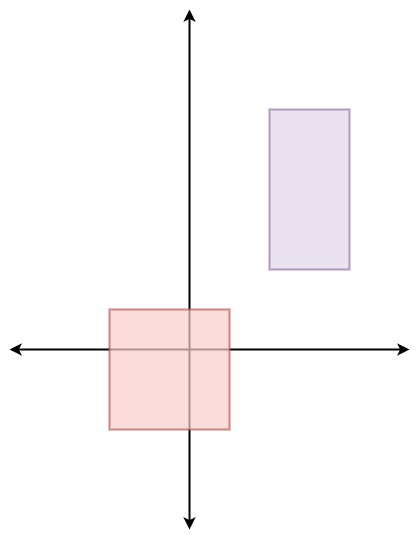Algorithm
Problem Name: 497. Random Point in Non-overlapping Rectangles
You are given an array of non-overlapping axis-aligned rectangles rects where rects[i] = [ai, bi, xi, yi] indicates that (ai, bi) is the bottom-left corner point of the ith rectangle and (xi, yi) is the top-right corner point of the ith rectangle. Design an algorithm to pick a random integer point inside the space covered by one of the given rectangles. A point on the perimeter of a rectangle is included in the space covered by the rectangle.
Any integer point inside the space covered by one of the given rectangles should be equally likely to be returned.
Note that an integer point is a point that has integer coordinates.
Implement the Solution class:
Solution(int[][] rects)Initializes the object with the given rectanglesrects.int[] pick()Returns a random integer point[u, v]inside the space covered by one of the given rectangles.
Example 1:

Input ["Solution", "pick", "pick", "pick", "pick", "pick"] [[[[-2, -2, 1, 1], [2, 2, 4, 6]]], [], [], [], [], []] Output [null, [1, -2], [1, -1], [-1, -2], [-2, -2], [0, 0]] Explanation Solution solution = new Solution([[-2, -2, 1, 1], [2, 2, 4, 6]]); solution.pick(); // return [1, -2] solution.pick(); // return [1, -1] solution.pick(); // return [-1, -2] solution.pick(); // return [-2, -2] solution.pick(); // return [0, 0]
Constraints:
1 <= rects.length <= 100rects[i].length == 4-109 <= ai < xi <= 109-109 <= bi < yi <= 109xi - ai <= 2000yi - bi <= 2000- All the rectangles do not overlap.
- At most
104calls will be made topick.
Code Examples
#1 Code Example with Javascript Programming
Code -
Javascript Programming
const Solution = function(rects) {
this.rects = rects
this.areas = rects.map(([x1, y1, x2, y2]) => (x2 - x1 + 1) * (y2 - y1 + 1))
}
Solution.prototype.pick = function() {
const { rects, areas } = this
let areaSum = 0
let selected
for (let i = 0; i < rects.length; i++) {
const area = areas[i]
areaSum += area
const p = area / areaSum
if (Math.random() < p) {
selected = rects[i]
}
}
const [x1, y1, x2, y2] = selected
return [
((Math.random() * (x2 - x1 + 1)) | 0) + x1,
((Math.random() * (y2 - y1 + 1)) | 0) + y1
]
}
Input
Output
#2 Code Example with Python Programming
Code -
Python Programming
class Solution:
def __init__(self, rects):
self.rects, self.ranges, sm = rects, [], 0
for x1, y1, x2, y2 in rects:
sm += (x2 - x1 + 1) * (y2 - y1 + 1)
self.ranges.append(sm)
def pick(self):
x1, y1, x2, y2 = self.rects[bisect.bisect_left(self.ranges, random.randint(1, self.ranges[-1]))]
return [random.randint(x1, x2), random.randint(y1, y2)]
Input
Output
#3 Code Example with C# Programming
Code -
C# Programming
using System;
namespace LeetCode
{
public class _0497_RandomPointInNonOverlappingRectangles
{
private readonly int[][] rects;
private readonly int totalPointCount;
private readonly int[] points;
private readonly Random random;
public _0497_RandomPointInNonOverlappingRectangles(int[][] rects)
{
this.rects = rects;
points = new int[rects.Length];
for (int i = 0; i < rects.Length; i++)
{
var rect = rects[i];
totalPointCount += (rect[2] - rect[0] + 1) * (rect[3] - rect[1] + 1);
points[i] = totalPointCount;
}
random = new Random();
}
public int[] Pick()
{
var target = random.Next(totalPointCount);
var index = Array.BinarySearch(points, target);
if (index < 0)
index = ~index;
else
index++;
var rect = rects[index];
var width = rect[2] - rect[0] + 1;
var height = rect[3] - rect[1] + 1;
var prevPoints = points[index] - width * height;
return new int[2] { rect[0] + (target - prevPoints) % width, rect[1] + (target - prevPoints) / width };
}
}
}
Input
Output
